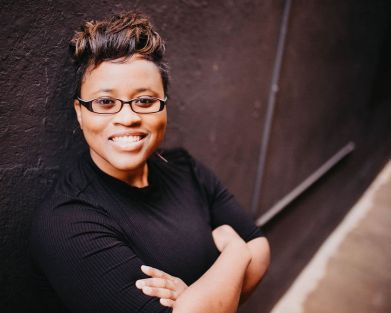Jackie McGriff is working to dismantle stereotypes through aural and visual stories from members of the Black, Indigenous and People of Color community.
McGriff, a program assistant at the University of Rochester’s Office of Alumni Relations, has launched the Our Voices Project, a short documentary series that, for now, lives online.
The project was born out of frustration over the killing of George Floyd in Minneapolis, followed by the outrage in Rochester over the death of Daniel Prude at the hands of police and other tragedies across the nation.

McGriff, who also has a photography business, wanted to take action. A list maker, her thoughts revealed a pattern: the perception of BIPOC individuals in the media and how these minorities saw each other. She wanted to chronicle their experiences.
“I want to get their stories, not the stories we so often see on screen where there’s (creative) licenses taken with their stories or the whole story isn’t being told or there’s just misrepresentation or a lack of representation,” McGriff says. “I wanted to get stories from their perspective. I wanted a multifaceted view of these different groups from different people.”
At the heart of Our Voices lies the mission to show the BIPOC community isn’t a monolith.
“Some of us grew (up) in rural areas, some of us grew up in the city and some of us grew up in the suburbs,” McGriff says. “Even with that there are so many different experiences that we have all had. We just happen to be the same color.”
Teamed with Deborah Alvarez, a cinematographer and editor, McGriff provides a safe space for BIPOC individuals to share three experiences that shaped them into the person they are today. McGriff and Alvarez then work with the storyteller to bring it to life. Our Voices also connects storytellers with each other, offering educational resources across marginalized groups unearthed through these stories.
“It’s essentially building out a community, helping us see one another—Black, Indigenous, People of Color—getting a multifaceted perception of who we are, possibly learning some history that’s not necessarily learned or taught in classrooms,” McGriff says.
The first voice in the series belongs to Mona Isler. She takes the audience through her childhood, being called light-skinned, a term that felt like an insult when coming from family and friends.
“I always felt bad about being light-skinned,” Isler says. “I felt I was different.”
She wasn’t fully accepted by African Americans because of her skin color and though among whites she was looked upon as “less dangerous,” that acceptance wasn’t complete either.
“Even to this day when I’m referred to as light-skinned, I kind of bristle,” Isler says. “It’s a long-lasting damage that for some people might seem insignificant but for me it has affected my entire life, wanting to feel like I was a part of my community, to be fully and wholly accepted despite how light my skin is.”
Six years ago, Isler started her journey with natural hair.
“I recognized that I was brought up to believe that straight hair was the right way, that straight hair was good and that my natural, kinky, coily hair was bad,” she says.
She has learned to embrace it and accept its beauty in the face of judgment. Isler also talks about finding her voice in improvisation, a world where she was often the only Black person in a class or a troupe.
Stories like Isler’s, McGriff hopes, will resonate with others.
“I would love to see people be more empathetic toward each other and really hearing their stories,” she says.
The Greece native recalls being bullied as a Black girl growing up in the suburbs. McGriff went to a predominantly Black church where her manner of speaking and the music she favored at the time were questioned.
“I’ve had to fight for my identity,” she says.
As McGriff and Alvarez juggle full-time jobs and side gigs, they are slowly interviewing people in Rochester. Already, a teacher in Illinois has asked if she could bring the project to her students.
Plans for the future could include a documentary and expansion into other cities. At the moment, McGriff is focused on local stories.
“I call it my passion project,” she says. “We’re not just these things that the media perceives us to be. We are so much more.”
Smriti Jacob is Rochester Beacon managing editor.